Delegated Powers and Law Reform Committee
Work of the Delegated Powers and Law Reform Committee in 2018-19
Introduction
This report reflects upon the work of the Delegated Powers and Law Reform (DPLR) Committee in 2018-19, the third year of the fifth session of the Scottish Parliament. Reports of this nature have been produced by this Committee and its predecessor committee (the Subordinate Legislation Committee) since 2012.
The Delegated Powers and Law Reform Committee’s remit encompasses a number of different roles which are considered in this report, but its primary focus is upon the scrutiny of delegated powers in bills and Scottish Statutory Instruments (SSIs).
In performing its roles the Committee has two specific objectives:
to ensure that Scots law is clear, accessible, and operable; and
to hold the responsible authority (primarily the Scottish Government) to account.
This report and the quarterly reports the Committee produces over the course of the reporting year are integral to meeting these objectives. Specifically, this report:
reviews the quality of the instruments laid by the Scottish Government and in doing so holds the Government to account while seeking to drive continuous improvement in the quality of SSIs laid; and
considers the Committee's scrutiny of delegated powers in primary legislation. The report reflects on issues that have arisen in relation to the scrutiny of delegated powers and the Committee's effectiveness in persuading the Scottish Government to bring forward amendments to the legislation to respond to issues identified by the Committee.
This report is therefore part of a broader process of holding the Scottish Government to account. The Committee will also take evidence from the Minister for Parliamentary Business and Veterans to respond to issues raised in the report.
It should be noted that the report also considers the quality of the instruments laid by the Lord President's Private Office (LPPO). More on the role of the LPPO can be found below.
The Committee met 36 times in the reporting period.
Membership Changes
Previous Members of the Committee during the reporting year:
Alison Harris (from 22 November 2016 to 17 September 2019)
Neil Findlay (from 16 January 2018 to 30 October 2018)
What is an SSI?
Before looking at the instruments which were laid in 2018-19, it is useful to explain what Scottish Statutory Instruments are.
SSIs are a form of law made by the Scottish Ministers (or other responsible authority such as the Lord President) exercising powers granted by the Scottish Parliament.
SSIs are usually in the form of regulations, orders, rules or schemes. They generally set out technical details or administrative matters necessary for primary legislation to operate, but can cover any subject matter ranging from criminal penalties, licensing schemes, implementing EU obligations, prescribing application forms, to providing procedural rules.
The content of SSIs is, however, limited by the terms of the primary legislation which authorises their use – referred to as the "enabling power" or "parent Act". The Delegated Powers and Law Reform Committee considers these enabling powers in Bills as they pass through the Parliament then also consider the SSIs that are later made under these powers.
The role of the Committee is to consider these instruments from a technical perspective. It:
scrutinises SSIs on behalf of the Parliament to ensure that proposed laws are within the powers the Parliament has delegated to Ministers in the parent Act – a law which is not within the enabling powers is invalid and has no legal effect;
checks the quality of each SSI to ensure that it is accurate, achieves the intended policy and the drafting is clear to the end user; and
through exchange of correspondence and its reports, encourages and monitors corrective action by the Scottish Government and other rule making authorities
The policy issues raised by SSIs are considered separately by the Scottish Parliament's various subject committees such as the Justice Committee, the Health and Sport Committee and the Environment, Climate Change and Land Reform Committee. These are known as the "lead committees".
Instruments considered in 2018-19
SSI Procedures
There are a number of different procedures that can be used when scrutinising an SSI. The procedure used in relation to each instrument is determined by what is said in the instrument's "Parent Act" - this is the legislation that authorises the use of subordinate legislation on a given matter.
The three most common procedures are:
Affirmative – this procedure is attached to instruments relating to significant matters and provides for a greater level of scrutiny than the other two main procedures. Before an instrument which is subject to the affirmative procedure can be made and brought into force, it must be approved by the Parliament.
Negative – this is the most common procedure attached to instruments laid before the Parliament. It is generally attached to instruments relating to matters of less significance than those subject to affirmative procedure. While the Parliament does not need to approve negative instruments before they can come into force, the Parliament can annul a negative instrument.
Laid, no procedure – these are instruments subject to the lowest level of scrutiny in the Parliament. They are laid before the Parliament for technical scrutiny and neither require approval nor can they be annulled.
How does the Committee report instruments?
Before examining the quality of the instruments laid by the Scottish Government this year, it is useful to reflect on how the Committee reports instruments. In considering each instrument the Committee is guided by a set of reporting grounds.
Rule 10.3 of Standing Orders outlines these reporting grounds. In order to make these more understandable and reflective of the extent of the Committee's concerns, the Committee has developed a hierarchy of reporting grounds.
“Significant grounds” represent those areas which would cause the Committee most concern; “other grounds” consist of areas where that concern would not be so significant, but nonetheless the matters can affect the understanding of an instrument if not its validity; and “advisory grounds” relate to matters which the Committee wishes to draw to the attention of the Parliament or lead committee but do not affect the understanding of an instrument.
Significant grounds:
ground (e) – (doubt as to whether it is intra vires);
ground (f) – (raises a devolution issue); and
ground (i) – (drafting appears to be defective).
Other grounds:
ground (c) – (where the instrument has retrospective effect where the parent statute confers no express authority so to provide);
ground (d) – (unjustifiable delay in publication or laying);
ground (h) – (clarity of form or meaning); and
the general reporting ground (which includes minor drafting errors and failures to follow proper drafting practice)
Advisory grounds:
ground (a) – (charges on or payments to the Scottish Consolidated Fund);
ground (b) – (made in pursuance of any enactment containing specific provisions excluding it from challenge in the courts);
ground (g) – (unusual or unexpected use of the powers conferred by the parent statute); and
ground (j) – (non-compliance with laying requirements), where the Committee is satisfied with the reasons given for non-compliance.
The intention of this approach is to enable the Scottish Government, lead committees, stakeholders and the public more generally to understand the extent of the Committee's concerns and respond accordingly.
Process of the consideration of an SSI
After the Delegated Powers and Law Reform Committee has considered an instrument from a technical perspective, the subject committee within whose remit the instrument falls then has an opportunity to consider the instrument from a policy perspective.
The following infographic explains the process by which an instrument is taken through the Parliament.
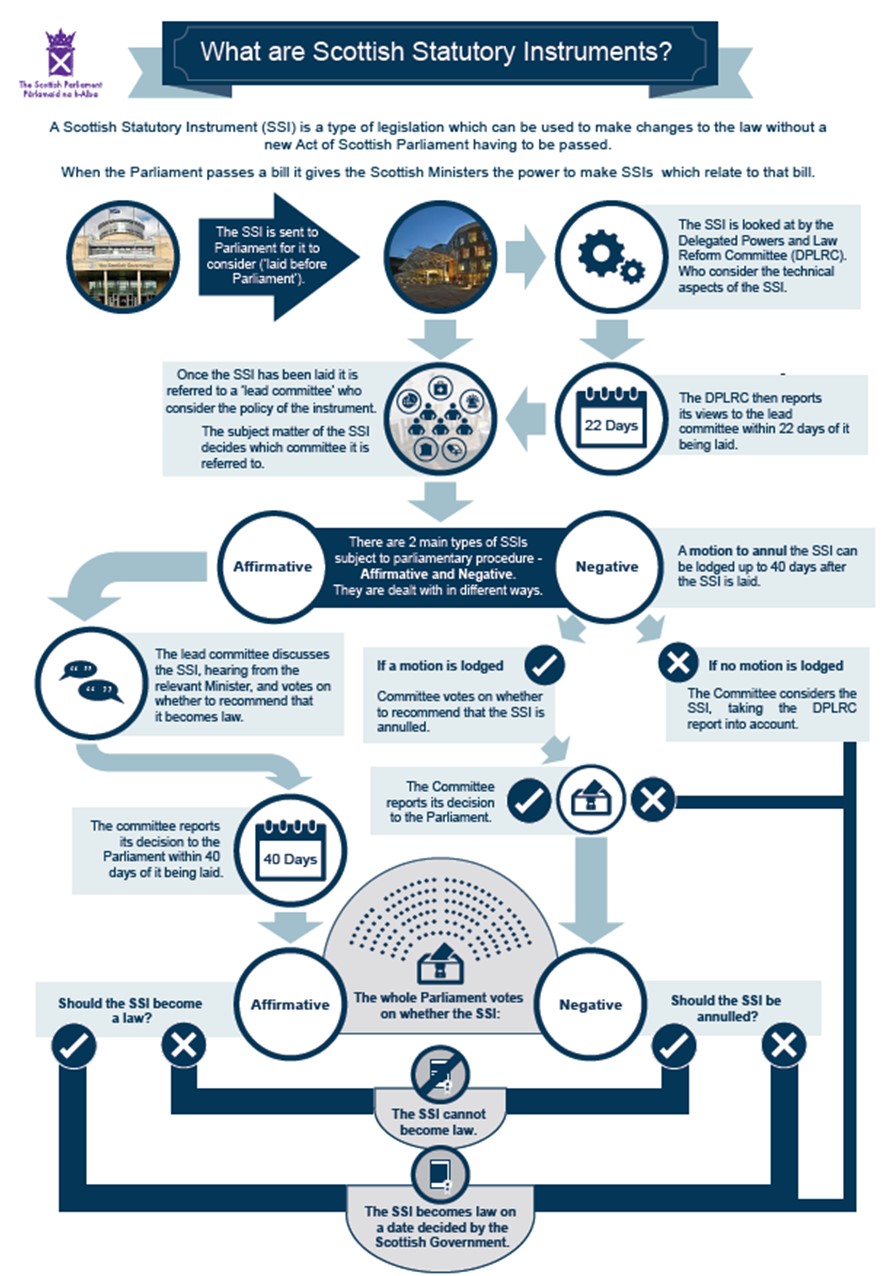
How many instruments were considered this year?
The Committee considered 243 instruments during this reporting period. This compares with 279 considered in 2017-18.
Of the 243 instruments, 223 were laid by the Scottish Government and 20 by the Lord President's Private Office ("LPPO"). In both cases this is slightly fewer than last year where the numbers laid were 256 and 23 respectively.
One reason for the decrease in Scottish Government instruments is the volume of EU Exit instruments and extra requirements for instruments under the European Union (Withdrawal) Act 2018. The impact of these instruments has been explored by the Committee in its regular evidence session with the Minister for Parliamentary Business and Veterans, Graeme Dey MSP. At its meeting on 11 December 2018, the Minister told the Committee that, to date, domestic SSIs had not been held back as a consequence of Brexit legislation. Mr Dey added:
Where prioritisation becomes necessary, our key consideration is the public interest, but we would also take account of the impact on the committees, which have work programmes that often have to dovetail quite closely. If we had decisions to take that would impact the committees, we would engage with them.
In a later evidence session, on 7 May 2019, Mr Dey informed the Committee that prioritisation had become necessary:
Some SSIs that were considered non-urgent were paused—we did that in conjunction with the relevant committees—and that has created a backlog. At the moment, we are looking at when, and whether, we need to reintroduce some of those SSIs to the process. Things will have moved on, and some may not be necessary.
We proactively deferred 38 domestic SSIs across the whole of Government at that time. That was partly because of the need to free up legal styling resource because of Brexit, but there were occasionally other reasons. The deferred SSIs will be reintroduced as and when it is possible to do that. Some will not need to be reintroduced urgently, so there will be time to space them out.
The Committee notes the continued decrease in the number of instruments laid this year (from 279 in 2017-18 to 243 this year) and that this coincides with large volumes of EU Exit legislation. The Committee would welcome an update from the Scottish Government on the impact the demands of EU Exit legislation has had on the domestic SSI programme.
The 223 SSIs laid by the Scottish Government can be broken down by procedure as follows:
132 negative
65 affirmative
23 laid, no procedure
1 super-affirmative
2 documents laid for approval (documents laid for approval are not legislation but are subject to the same parliamentary procedure as an affirmative instrument).
The 20 SSIs laid by the LPPO can be broken down by procedure as follows:
17 laid, no procedure
3 negative
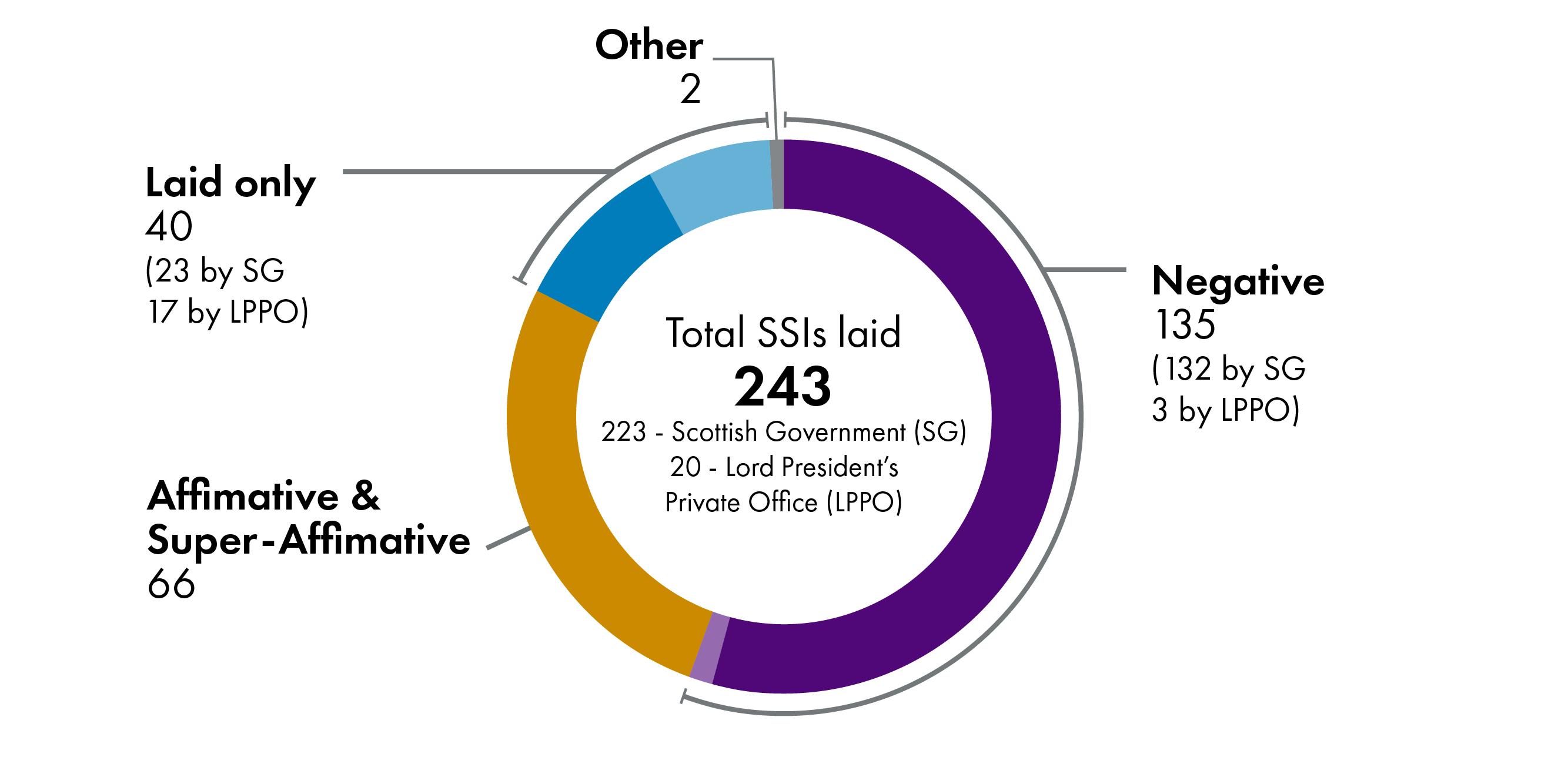
Scottish Government Instruments
How many instruments were reported on this year?
As can be seen in the table below, the proportion of instruments reported this year remains at 11.5%, as in the 2017-18 reporting period.
| 2017-18 | 2018-19 | |
|---|---|---|
| Total SSIs | 256 | 223 |
| Total Reportedi | 30 | 26 |
| % Reported | 11.5% | 11.5% |
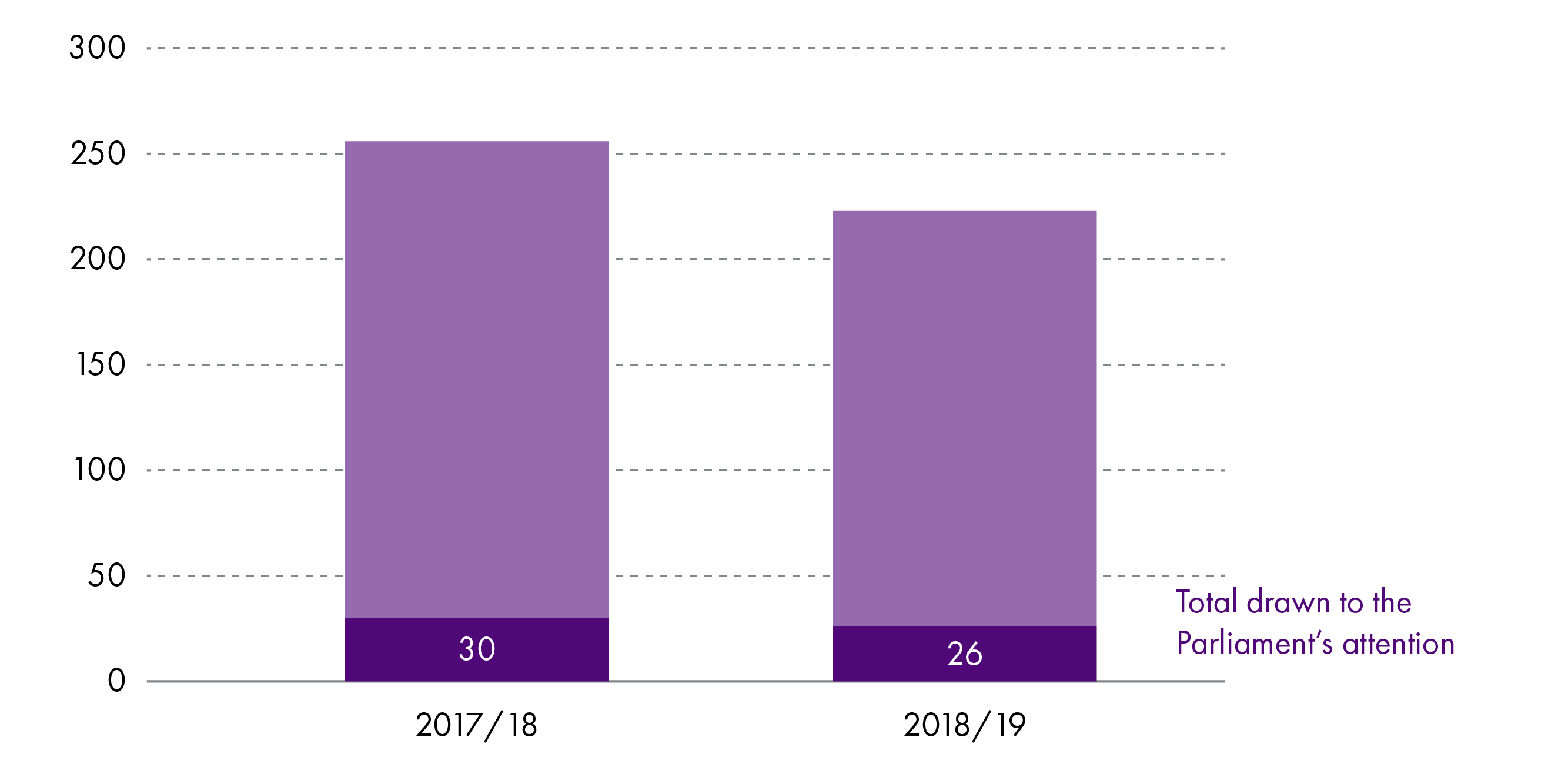
The Committee notes that the quality of instruments has been maintained this year but calls on the Scottish Government to build upon this to ensure continued improvement.
Summary of use of reporting grounds
As discussed earlier in the report, instruments are reported by the Committee under one of eleven grounds as set out in rule 10.3 of Standing Orders.
The table below shows a breakdown of reported instruments by reporting ground.i A list of the instruments reported under each ground can be found in Annex A.
| Reporting Grounds | 2017-18 (256 SSIs) | 2018-19 (223 SSIs) |
|---|---|---|
| Significant Grounds | ||
| (e) doubt as to whether the instrument is intra vires | 1 | 1 |
| (f) raises a devolution issue | 3 | 1 |
| (i) drafting appears to be defective | 7 | 3 |
| Other Grounds | ||
| (c) retrospective effect where the parent statute confers no express authority so to provide | 0 | 0 |
| (h) form or meaning could be clearer | 8 | 8 |
| General ground (e.g. failures to follow proper drafting practice or legislative process) | 16 | 17 |
| Advisory Grounds | ||
| (a) charge on the Scottish Consolidated Fund | 0 | 0 |
| (b) made in pursuance of any enactment containing specific provisions excluding it from challenge in the courts | 0 | 0 |
| (g) unusual or unexpected use of the powers conferred by the parent statute | 3 | 0 |
| Procedural Grounds | ||
| (d) unjustifiable delay in the publication or the laying of it before the Parliament | 0 | 0 |
| (j) failure to comply with laying requirementsii | 0(10) | 0(8) |
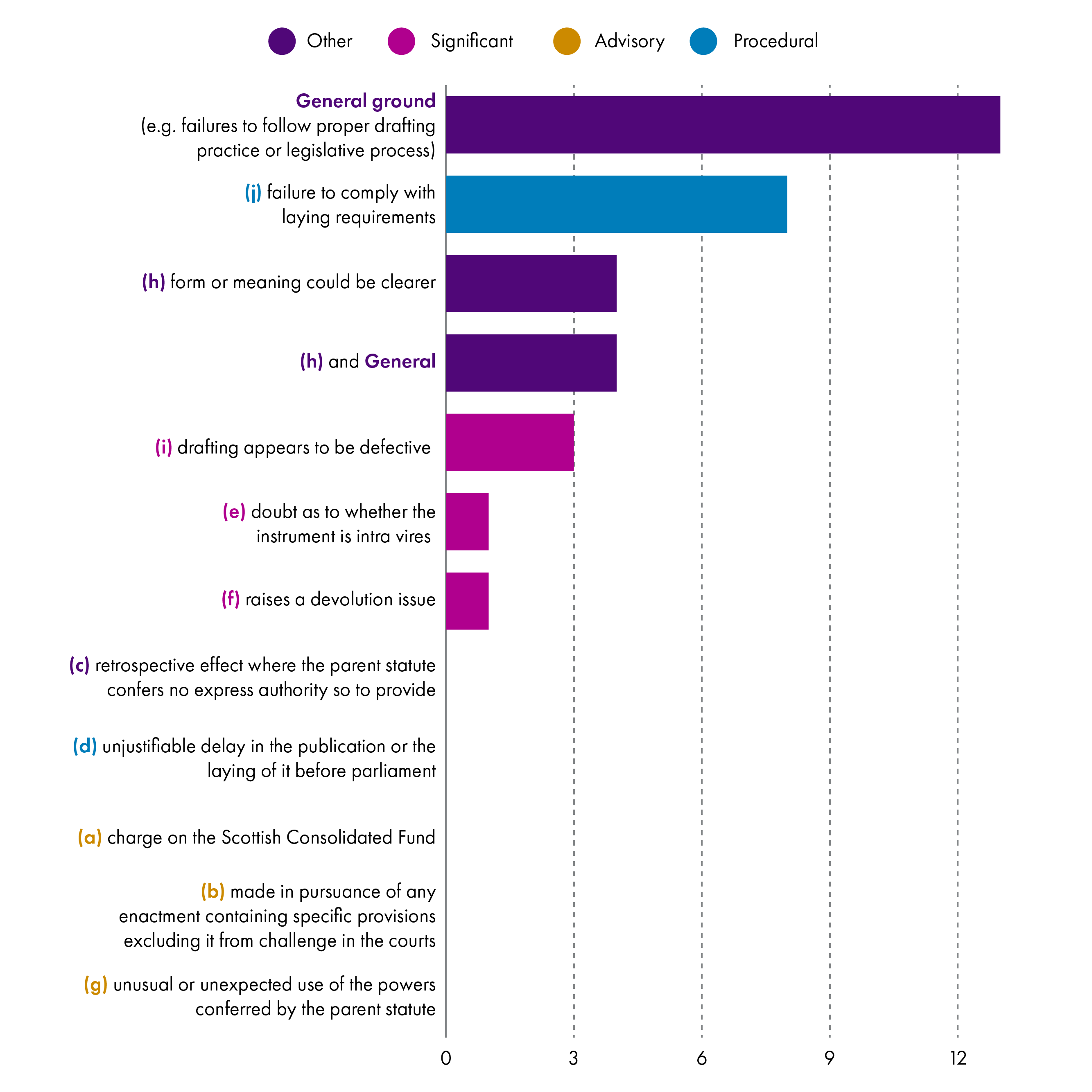
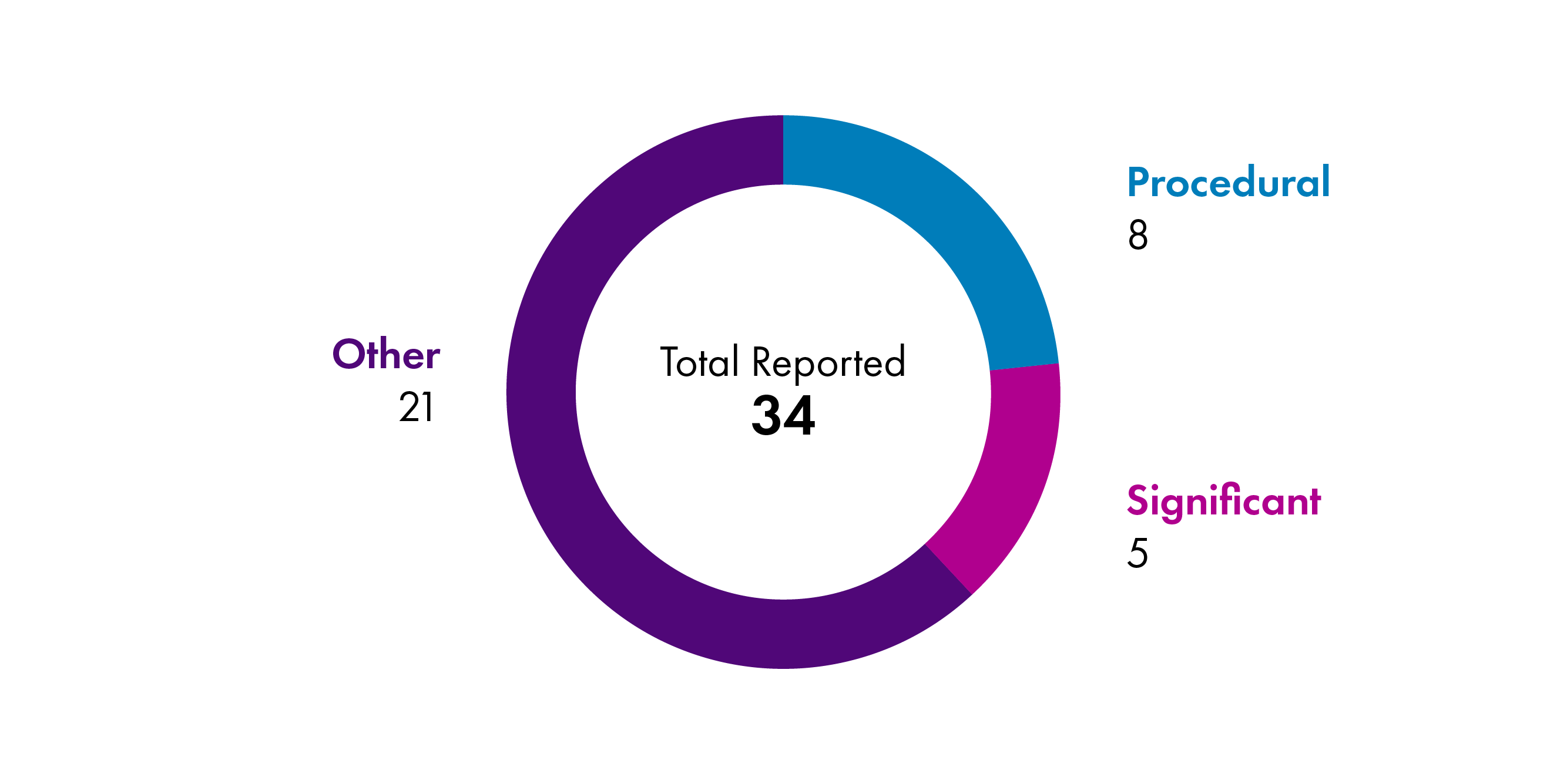
The number of instruments being reported under the most serious reporting grounds has decreased to 5 this reporting year.
The Committee welcomes this improvement in the number of instruments being reported on serious grounds.
Which Committees received the most instruments?
The table below shows the instruments laid by the Scottish Government (and those reported) over the last two reporting years, broken down by lead committee.
| Lead Committee | Total SSIs | Reported SSIsi | % Reported | |||
|---|---|---|---|---|---|---|
| 2017-18 | 2018-19 | 2017-18 | 2018-19 | 2017-18 | 2018-19 | |
| Environment, Climate Change and Land Reform | 26 | 21 | 2 | 4 | 7.5% | 19% |
| Health and Sport | 52 | 27 | 6 | 3 | 11.5% | 11% |
| Justice | 60 | 28 | 6 | 0 | 10% | 0 |
| Local Government and Communities | 38 | 33 | 3 | 4 | 8% | 12% |
| Educations and Skills | 24 | 9 | 5 | 1 | 21% | 11% |
| Rural Economy and Connectivity | 34 | 53 | 4 | 8 | 12% | 15% |
| Economy, Energy and Fair Work | 7 | 13 | 0 | 1 | 0 | 7% |
| Finance and Constitution | 4 | 8 | 0 | 0 | 0 | 0 |
| Equalities and Human Rights | 1 | 1 | 1 | 0 | 100% | 0 |
| Social Security | 6 | 29 | 3 | 5 | 50% | 17% |
| Standards, Procedures and Public Appointments | 2 | 0 | 0 | 0 | 0 | 0 |
| Delegated Powers and Law Reform Committee | 1 | 0 | 0 | 0 | 0 | 0 |
| Parliament | 1 | 1 | 0 | 0 | 0 | 0 |
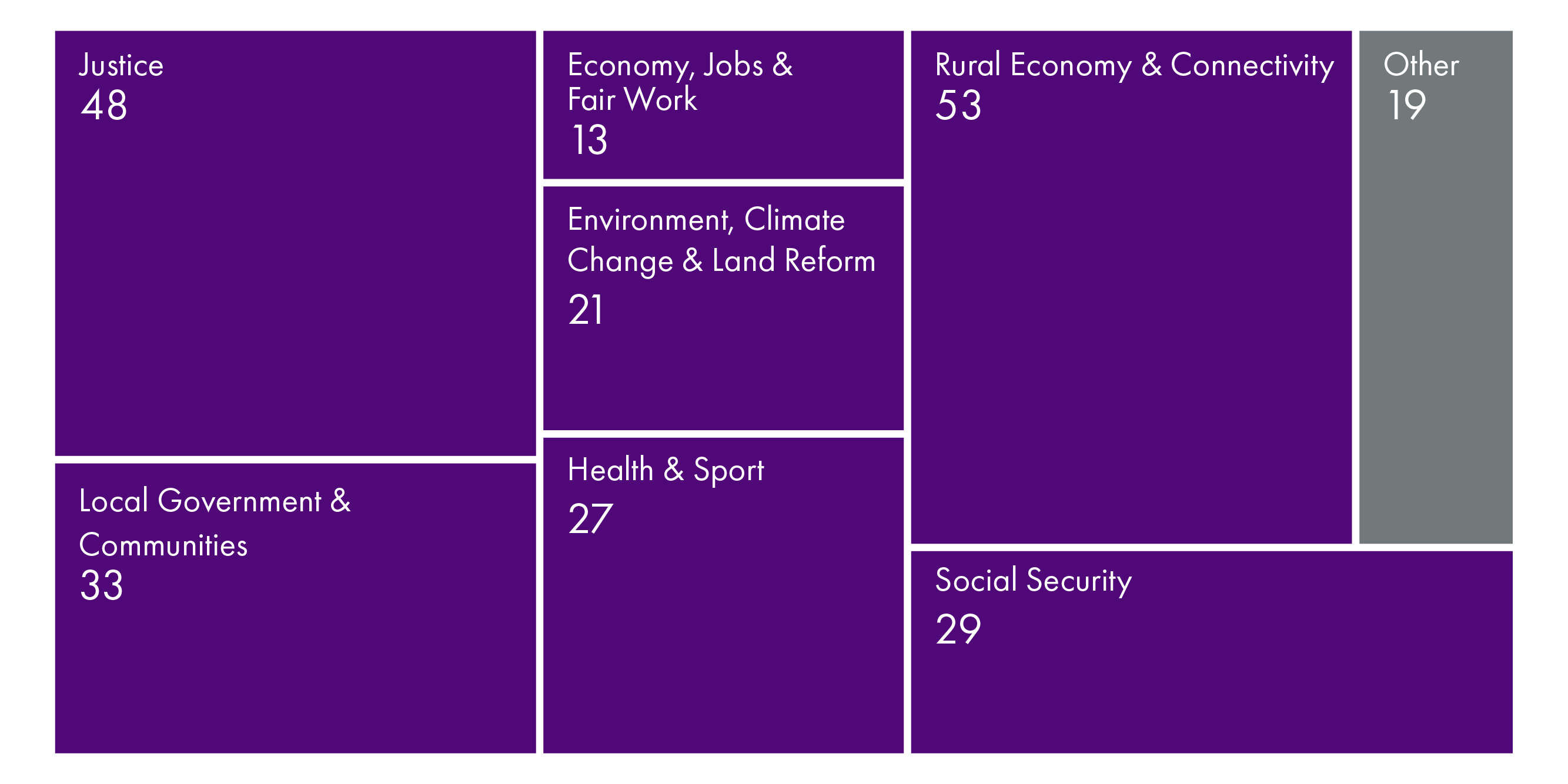
There have been some significant changes this year to the numbers of instruments being received by each Committee.
The number considered by the Health and Sport Committee has decreased from 52 to 27; the Justice Committee from 60 to 28 and the Education and Skills Committee from 24 to 9.
Conversely, the Rural Economy and Connectivity has seen a substantial increase from 34 to 53. The number considered by the Finance and Constitution Committee has doubled but still remains comparatively small (from 4 to 8). Similarly, the Economy, Energy and Fair Work Committee has considered almost double the number of instruments this year (from 7 to 13).
These changes can be accounted for by the number of EU Exit instruments being laid in this reporting year. A significant number of these instruments fell within the remit of the Rural Economy and Connectivity Committee in particular. Conversely, the remit of the Justice Committee, which normally considers a high number of SSIs, is less engaged in the preparations for exiting the European Union. These EU instruments are discussed further later in the report.
As predicted in the Committee's 2017-18 report, the number of instruments considered by the Social Security Committee has also substantially increased from 6 to 29 due to the commencement of provisions of the Social Security (Scotland) Act 2018.
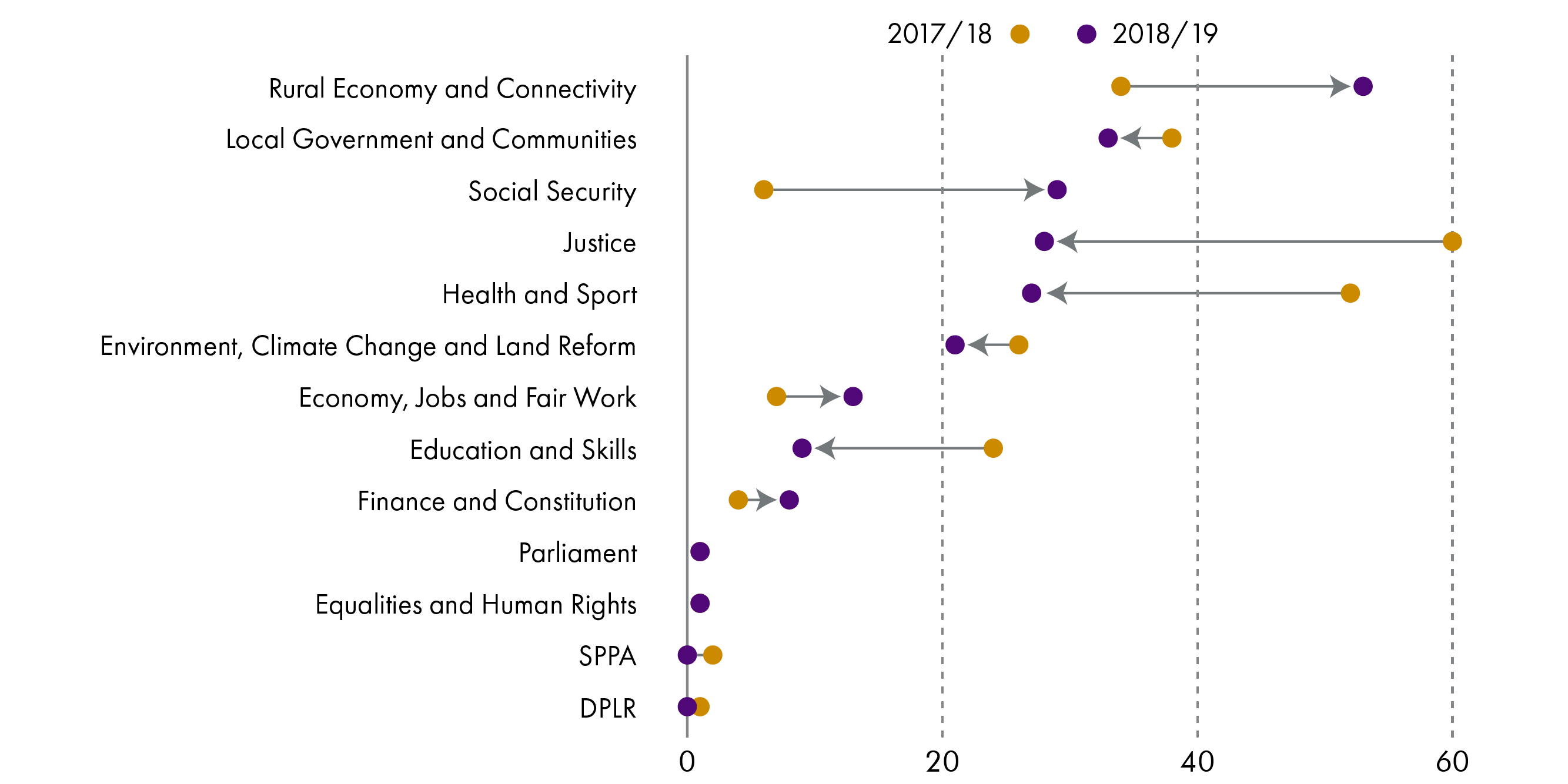
Improvements to the quality of instruments have been seen by a number of Committees. The Social Security Committee has gone from 50% of its instruments being reported to 17%. This is a significant improvement, particularly considering the increased number of instruments being laid in this area.
The Education and Skills Committee has also seen an improvement from 21% to 11% and the Justice Committee has seen a fall in reported instruments from 10% to none.
The Environment, Climate Change and Land Reform Committee, however, has seen a fall in the quality of its instruments with 19% being reported this year compared with 7.5% last year.
Instruments from the Lord President's Private Office
Instruments can be laid by the Lord President's Private Office (LPPO) on behalf of the Court of Session and High Court of Justiciary. These instruments are used to update court rules in Scotland and can be split into two distinct camps:
Acts of sederunt are used primarily to regulate civil procedure in the Court of Session and Sheriff Courts
Acts of adjournal are concerned with regulating criminal procedure in the High Court of Justiciary and Sheriff Courts
Both acts of sederunt and acts of adjournal are subject to the same level of scrutiny by the Committee as any other SSI. They are laid by the LPPO as the Lord President is the head of the judiciary in Scotland.
These instruments are laid separately from those laid by the Scottish Government so a separate analysis of the quality of these instruments is provided below.
| 2017-18 | 2018-19 | |
|---|---|---|
| Total SSIs | 23 | 20 |
| Total Reportedi | 2 | 1 |
| % Reported | 8.5% | 5% |
This table shows a small reduction in the number of instruments laid by the LPPO. In 2016-17, 29 instruments were laid so this year continues a downward trend.
There has also been a further decrease in the proportion of instruments reported. Only 1 instrument has been reported during this period (5% of instruments considered). This is down from 8.5% last year which was itself a significant improvement from the 20.5% in 2016-17 and 45% in 2015-16.
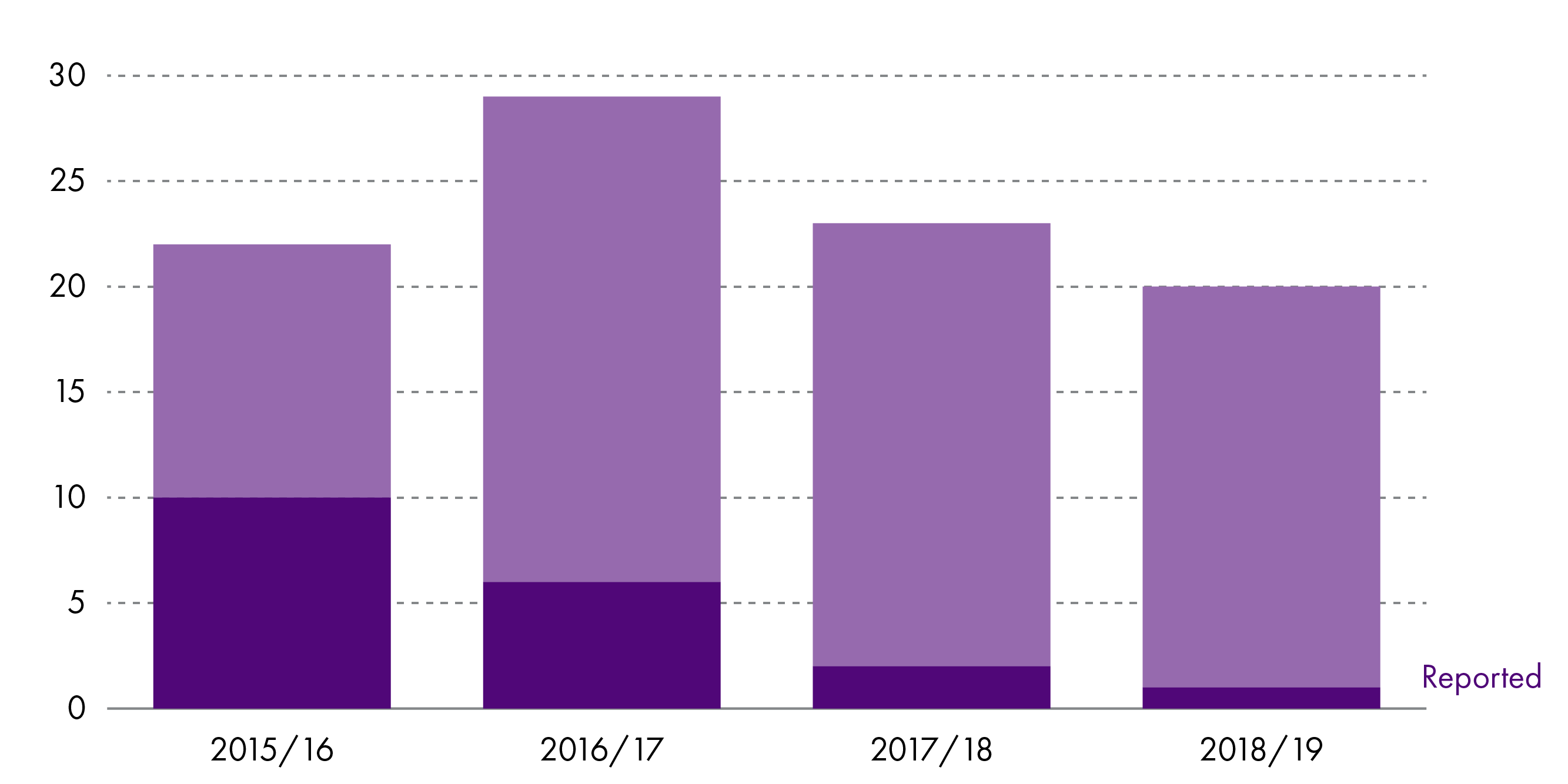
The instrument that was reported this year was reported under reporting ground (i) (drafting appears to be defective) and the general reporting ground. In 2017-18, the two LPPO instruments reported were under the general reporting ground.
While the Committee welcomes the reduction in reported instruments, it does consider (i) to be one of the more significant reporting grounds so it is concerned when instruments fall into this category.
Given that 45% of LPPO instruments were reported as recently as 2015-16, a fall to just 5% is a remarkable improvement. While the Committee is always concerned when an instrument falls within one of the more significant reporting grounds, overall the Committee welcomes the high standard of instruments laid by the LPPO in recent years and the further improvement that can be seen in this reporting period. The Committee encourages the LPPO to maintain and build upon these high standards.
Amending instruments
Scottish Government Instruments
Over the course of the reporting year, the Scottish Government laid 12 amending instruments which corrected errors in instruments that were drawn to the attention of the Parliament by the Committee.
There are also errors in instruments that remain outstanding but which the Scottish Government has given a commitment to correct. A list of all outstanding commitments can be found at Annex B.
The number of outstanding commitments has previously been pursued by this Committee and its predecessor committee in Session 4. The Scottish Government has made progress towards meeting the commitments made in previous years, with only 7 now being outstanding, down from 12 remaining at the start of this reporting year.
The Minister for Parliamentary Business and Veterans, Graeme Dey, MSP stated in his evidence to the Committee on 11 December 2018 and in a follow-up letter to the Committee that it was the Scottish Government's intention to fulfil the current commitments by the end of this session, and as many new commitments as possible, as quickly as possible.
The Committee welcomes the commitment from the Scottish Government to ensure all historic commitments are met by the end of this session and the continued progress that has been made towards this.
Turning to commitments made this year, 11 of these remain outstanding. At the time of the 2017-18 report, only 4 of the commitments given that year were outstanding. This would suggest that the Government has been slower in addressing new commitments than in the previous year.
The new commitments combined with the historic commitments brings the total outstanding Scottish Government commitments to 18. This is a similar number to that in each of the last two reporting years (16 in 2017-18 and 20 in 2016-17).
The Committee welcomes the progress on historic commitments but encourages the Scottish Government to endeavour to meet new commitments made to the Committee as soon as possible.
LPPO Instruments
The LPPO laid no amending instruments during this reporting period and has no outstanding commitments.
Withdrawal of instruments
If concerns are raised by the Committee in relation to affirmative SSIs, the Scottish Government can withdraw the instruments during their passage through the Parliament.
During this reporting year the following 11 instruments were withdrawn:
First-tier Tribunal for Scotland Social Security Chamber and Upper Tribunal for Scotland (Composition) Regulations 2018;
Agricultural Holdings (Scotland) Act 1991 (Variation of schedule 5) Order 2018;
Common Financial Tool (Scotland) Regulations 2018;
Genetically Modified Organisms (Deliberate Release etc.) (Miscellaneous Amendments) (Scotland) Regulations 2019;
INSPIRE (EU Exit) (Scotland) (Amendment) Regulations 2019;
Public Procurement etc. (Scotland) (Amendment) (EU Exit) Regulations 2019;
Budget (Scotland) Act 2018 Amendment Regulations 2019;
Forestry (EU Exit) (Scotland) (Amendment etc.) Regulations 2019;
Plant Health (EU Exit) (Scotland) (Amendment etc.) Regulations 2019;
Private Housing (Tenancies) (Scotland) Act 2016 (Modification of Schedule 1) Regulations 2019
This is an increase on the last two reporting years where the number withdrawn was 7 (2017-18) and 8 (2018-19).
The Committee concerned about this increase and calls on the Scottish Government to consider what could be done to ensure instruments laid are of such a standard that they do not require to be withdrawn.
Minor points raised
Minor points are generally typographical or referencing errors in instruments. While they do not affect the validity of the instrument, they are nevertheless drafting errors which can point to wider concerns with the quality of instruments.
During its scrutiny of instruments in 2018-19, the Committee identified a total of 68 instruments on which minor points were raised (28% of instruments laid). This can be broken down into 63 instruments laid by the Scottish Government and 5 instruments laid by the LPPO.
This is a reduction on last year in which there were 93 instruments which included minor points (33% of instruments laid).
In its last annual report, the Committee called on the Scottish Government and the LPPO to improve their procedures to reduce the number of these types of errors and the Committee welcomes that some improvement has been made.
However, the percentage of instruments with minor points arising this year (28%) is still higher than in the 2016-17 reporting period (26.5%) so there is room for further improvement.
The Committee welcomes the improvements that have been made over the last year to reduce the number of minor points arising but continues to call on the Scottish Government and the LPPO to continue efforts to reduce this further.
Motions to annul
In this reporting period there has been one motion to annul. This was lodged by John Scott MSP on 12 March 2019 in relation to the Conservation (Natural Habitats, &c.) Amendment (Scotland) Regulations 2019 (SSI 2019/64).
This motion was disagreed to by division (For 1, Against 5, Abstentions 1) in the Environment, Climate Change and Land Reform Committee meeting of 19 March 2019.
Consolidation
As noted at the beginning of this report one of the Committee's objectives, and one which it repeatedly restates, is to ensure that law is clear and accessible to those who use the legislation. An obstacle to that objective is where instruments are amended on a considerable number of occasions meaning that the user of the legislation has to refer to multiple instruments to understand what the principal instrument is now doing.
One example of this, which was also highlighted in last year's report, is the Council Tax Reduction (Scotland) Regulations 2012.
The Committee have had ongoing correspondence with the Scottish Government in relation to these regulations and in 2017 Derek Mackay MSP, then Cabinet Secretary for Finance and the Constitution, wrote to the Committee setting out fully the Scottish Government's position. Mr Mackay acknowledged the desirability of consolidation but did not view this as essential. This has remained the Scottish Government's position.
The Committee, as stated in its 49th report of 2018, continues to encourage the Scottish Government to undertake a consolidation of the Council Tax Reduction (Scotland) Regulations 2012, within a reasonable timescale, in the interests of clarity and accessibility.
More generally, the Committee would encourage the Scottish Government to give consideration to whether a consolidation exercise could be undertaken where a principal Order or Regulations have been amended multiple times.
Quality of accompanying documents
When SSIs are laid before the Parliament they are generally accompanied by documents which provide some background to the purpose of the instrument and any additional information. These can be very helpful to readers as it allows them to get a better understanding of the SSI.
The quality of these documents was discussed in the Committee's 2017-18 report after being raised as an issue by the Conveners Group.
In the Committee's evidence session with the Minister for Parliamentary Business and Veterans, Graeme Dey, MSP on 11 December 2018, Mr Dey outlined the Scottish Government's approach to tackling the issue:
The approach that we have been planning to adopt will be rolled out from the start of 2019. A simple, two-paragraph covering note will come with any instrument to give an understanding, right at the outset, of what the instrument seeks to achieve. We have taken on board some of the valid criticisms that came from the Conveners Group, and that approach should become apparent in the early months of next year.
Mr Dey added:
We have revised our internal guidance to emphasise the need to provide accessible summaries and policy notes. Alongside that, we have been undertaking a sampling process and have been looking at instruments to see whether, on reflection, they do what they should do and are explained simply enough. That work has thrown up some good learning for us, and we will continue to develop that approach because it is clearly paying dividends—I could offer some examples. We recognise that we can do better, and that is what we aspire to do. I hope that those checking processes will help to get us there.
The Committee is not aware of any further concerns being raised in relation to these documents.
The Committee welcomes the steps taken by the Scottish Government to improve these important documents.
Instruments relating to the UK's withdrawal from the European Union
In this reporting year a significant number of instruments that have passed through the Parliament have been in order to address deficiencies in legislation that would arise on the UK's exit from the European Union.
The delegated powers to make these instruments are found in the European Union (Withdrawal) Act 2018. The instruments under this Act that are of relevance to the Scottish Parliament fall into two categories:
Scottish statutory instruments laid by the Scottish Government
Statutory instruments laid by the UK Government which relate to devolved matters
Two protocols have been created to establish how these are scrutinised by the Scottish Parliament. These are each considered below.
SSI Protocol
The SSI protocol was created in relation to the instruments laid by the Scottish Government to correct deficiencies. This adds an extra element to the normal SSI procedure by allowing committees to express a view on the categorisation of instruments as high or low significance and whether they should be subject to either the negative or the affirmative procedure.
This protocol was created in order to assist committees in prioritising their scrutiny of these instruments in anticipation of high volumes of SSIs under the Act.
During this reporting period, 31 SSIs were considered under this protocol (14% of instruments received from the Scottish Government). In all cases, the lead committee has agreed with the Scottish Government’s categorisation.
SI Protocol
The SI protocol applies in relation to UK statutory instruments stemming from the European Union (Withdrawal) Act 2018. Certain powers in this Act can only be exercised in devolved areas with the consent of the Scottish Ministers. The Scottish Parliament does not play a direct role is approving or disapproving these instruments.
However, the SI protocol creates a way for the Scottish Parliament to scrutinise the consent of Scottish Ministers to this legislation. This allows the Parliament to voice any concerns about the proposed SIs to the Scottish Ministers who can take account of this in their decision to consent or to withhold consent to the UK Government exercising its power in a devolved area.
During this reporting period, the Scottish Parliament considered 93 consent notifications.i In all cases, the Scottish Parliament agreed with the Scottish Ministers' intention to consent to the proposed SI.
Primary legislation
A primary function of the Committee is to consider the delegated powers provisions in bills introduced in the Scottish Parliament. Over the reporting period, the Committee has considered and reported on the following fourteen bills at Stage 1:
Management of Offenders (Scotland) Bill
Age of Criminal Responsibility (Scotland) Bill
Health and Care (Staffing) (Scotland) Bill
Vulnerable Witnesses (Criminal Evidence) (Scotland) Bill
Children (Equal Protection from Assault) (Scotland) Bill
Damages (Investment Returns and Periodical Payments) (Scotland) Bill
Restricted Roads (20 mph Speed Limit (Scotland) Bill
Census (Amendment) (Scotland) Bill
Human Tissue (Authorisation) (Scotland) Bill
Transport (Scotland) Bill
Climate Change (Emissions Reduction Targets) (Scotland) Bill
Budget (Scotland) (No.3) Bill
South of Scotland Enterprise Bill
Scottish National Investment Bank Bill
The Committee also considered and reported on the following seven bills after Stage 2:
Islands (Scotland) Bill
Housing (Amendment) (Scotland) Bill
Historical Sexual Offences (Pardons and Disregards) (Scotland) Bill
Scottish Crown Estate Bill
Health and Care (Staffing) (Scotland) Bill
Age of Criminal Responsibility (Scotland) Bill
Planning (Scotland) Bill
This is an important part of the Committee's work and can shape the legislation that is passed by the Parliament. An example of this is the Planning (Scotland) Bill which contained a substantial number of delegated powers. The Committee made recommendations in relation to a number of these that were taken forward by the Scottish Government in the amendments lodged at Stage 2.i
The Minister for Local Government and Planning, Kevin Stewart MSP, welcomed the work of the Committee on this Bill stating in a letter to the lead committee (the Local Government and Communities Committee):
The Scottish Government wishes to express its gratitude to the Delegated Powers and Law Reform Committee for its comprehensive report on the delegated powers set out in the Bill.i
Throughout Stage 2 proceedings the Minister frequently referenced the recommendations of the Committee and again expressed gratitude for its thorough scrutiny.
Scottish Law Commission Bills
The Delegated Powers and Law Reform Committee can be designated the lead committee in relation to Scottish Law Commission ("SLC") Bills. SLC Bills are bills that originate from SLC reports and meet the criteria determined by the Presiding Officer. The criteria for an SLC bill are that it is a bill within the legislative competence of the Scottish Parliament:
where there is a wide degree of consensus amongst key stakeholders about the need for reform and the approach recommended;
which does not relate directly to criminal law reform;
which does not have significant financial implications;
which does not have significant European Convention on Human Rights (ECHR) implications; and
where the Scottish Government is not planning wider work in that particular subject area.
During 2018-19 the Committee considered one SLC Bill - the Prescription (Scotland) Bill ("the Bill").
The Committee published its Stage 1 report on the Bill on 14 June 2018. While the Committee recommended to the Parliament that the general principles of the Bill be agreed to, it called on the Scottish Government to give further consideration to a number of issues ahead of Stage 2. The general principles of the Bill were agreed to at Stage 1 by the Parliament and has since been considered by the Committee at Stage 2, with 2 minor amendments agreed to. The Bill was subsequently passed by the Parliament on 8 November 2018.
SLC bills expected in the coming year
The Scottish Government's Programme for Government 2019-20 stated its intention to bring a Defamation and Malicious Publication Bill based on recommendations of the SLC.
However, this Bill is not considered likely to meet the Presiding Officer's criteria as an SLC Bill that could be considered by this committee.
SLC Bills Working Group
The time taken to bring forward SLC Bills is something that was raised by the Committee in its 2017-18 report and its 2016-17 report. The Committee has continued to be interested in the implementation rate of SLC reports.
In this reporting year the Committee has discussed whether the Presiding Officer's criteria (set out at paragraph 102 above) may need to be reviewed. The Committee established a working group to explore this issue.
The number of SLC Bills being brought forward by the Scottish Government is an area of continued interest to the Committee. In order to examine this issue further, the Committee agreed to establish a working group to review the Presiding Officer's criteria.
Legislative Consent Memorandums
The Committee considered and reported on Legislative Consent Memorandums (LCMs) in relation to the following five UK Parliament Bills:
Trade Bill
Offensive Weapons Bill
Counter-Terrorism and Border Security Bill
Fisheries Bill
Immigration and Social Security Co-Ordination (EU Withdrawal) Bill
LCMs are lodged by the Scottish Government in relation to UK Parliament bills which seek to change the law in relation to devolved matters.i
As with Bills before the Scottish Parliament, the Committee considers any powers to make subordinate legislation that are being delegated to Scottish Ministers.
The Trade Bill, the Fisheries Bill and the Immigration and Social Security Co-Ordination (EU Withdrawal) Bill made provision in preparation for the UK's exit from the European Union. In relation to these "Brexit Bills" the Scottish Government has maintained its position that it will not lodge legislative consent motions (there has been one exception to this with the Healthcare (International Arrangements) Bill but this falls outside the reporting period covered by this report).
Despite the Scottish Government's position, the Committee still fully scrutinises LCMs for Bills which propose delegated powers to Scottish Ministers. In relation to the Trade Bill this included taking oral evidence from:
George Hollingbery MP, Minister of State for Trade Policy, at its meeting on Wednesday 5 September 2018; and
Michael Russell MSP, Cabinet Secretary for Government Business and Constitutional Relations, at its meeting on Tuesday 11 September 2018.
Interparliamentary Forum on Brexit
The Interparliamentary Forum on Brexit was established following the recommendation of the House of Lords European Union Committee’s report "Brexit: devolution" that the structures of interparliamentary dialogue within the UK should be strengthened.
The Forum brings together chairs and conveners of the committees scrutinising Brexit-related issues in the Scottish Parliament, National Assembly for Wales, House of Commons and House of Lords. It is intended to provide a forum to discuss the scrutiny of the legislative consequences of the UK’s withdrawal from the European Union, and collective scrutiny of that process in legislatures across the UK.
The Forum has met twice in this reporting period:
17 January 2019 at the House of Lords
26 April 2019 at the Scottish Parliament
The Committee continues to welcome the opportunity the Forum provides for interparliamentary relations in the context of Brexit.
Conclusions
While the proportion of reported instruments has remained the same, at 11.5%, the Committee is heartened by the improvement indicated by the reduced use of significant reporting grounds.
The Committee is also pleased with the continued improvement in the quality of LPPO instruments which has been remarkable in recent years.
The number of historic commitments is continuing to fall. The Committee welcomes this but suggests greater progress is needed in relation to new commitments.
The Committee has also noted the volume of EU Exit legislation in this reporting year. EU Exit SSIs have made up a significant part of SSI workload and 93 SI notifications have been received. The protocols relating the these instruments implement novel processes in the Scottish Parliament, adding to the workload of committees. The Committee is interested in exploring how these instruments have impacted on the Government's secondary legislation programme.
Annex A - Reporting Grounds: 12 May 2018 to 11 May 2019
Scottish Government instruments engaging each reporting ground
(a) charge on the Scottish Consolidated Fund
None
(b) made in pursuance of any enactment containing specific provisions excluding it from challenge in the courts
None
(c) retrospective effect where the parent statute confers no express authority so to provide
None
(d) unjustifiable delay in the publication or the laying of it before the Parliament
None
(e) doubt as to whether it is intra vires
First-tier Tribunal for Scotland Social Security Chamber and Upper Tribunal for Scotland (Composition) Regulations 2018 [draft] Social Security
(f) raises a devolution issue
Council Tax Reduction (Scotland) Amendment (No. 2) Regulations 2018 (SSI 2018/211) Social Security
(g) unusual or unexpected use of the powers conferred by the parent statute
none
(h) meaning could be clearer
Scotland Act 1998 (Agency Arrangements) (Specification) Order 2018 (SSI 2018/626) Social Security
Housing (Scotland) Act 2006 (Modification of the Repairing Standard) Regulations 2019 [draft] Local Government and Communities
Equine Animal (Identification) (Scotland) Regulations 2019 (SSI 2019/30) Rural Economy and Connectivity
Town and Country Planning and Electricity Works (EU Exit) (Scotland) (Miscellaneous Amendments) Regulations 2019 (SSI 2019/80) Local Government and Communities
(i) drafting appears to be defective
Council Tax Reduction (Scotland) Amendment (No. 3) Regulations 2018 (SSI 2018/295) Social Security
Scotland Act 1998 (Specification of Functions and Transfer of Property etc.) Order 2019 (SSI 2019/183) Rural Economy and Connectivity
Agriculture Market Measures (EU Exit) (Scotland) (Amendment) Regulations 2019 (SSI 2019/73) Rural Economy and Connectivity
(j) failure to comply with laying requirements
Tuberculosis (Miscellaneous Amendments) (Scotland) Revocation Order 2018 (SSI 2018/202) Rural Economy and Connectivity
Wildlife and Countryside Act 1981 (EU Exit) (Scotland) (Amendment) Regulations 2019 (SSI 2019/84) Environment, Climate Change and Land Reform
Sea Fish Licensing (Foreign Vessels) (EU Exit) (Scotland) Order 2019 (SSI 2019/87) Rural Economy and Connectivity
Sea Fishing (Licences and Notices) (EU Exit) (Scotland) (Amendment) Regulations 2019 (SSI 2019/88) Rural Economy and Connectivity
Agriculture Market Measures (EU Exit) (Scotland) (Amendment) Amendment Regulations 2019 (SSI 2019/89) Rural Economy and Connectivity
Teachers’ Superannuation and Pension Scheme (Scotland) (Miscellaneous Amendments) Amendment Regulations 2019 (SSI 2019/95) Education and Skills
Non-Domestic Rates (Relief for New and Improved Properties) (Scotland) Amendment Regulations 2019 (SSI 2019/116) Local Government and Finance
Disabled Persons (Badges for Motor Vehicles) (EU Exit) (Scotland) (Amendment) Regulations 2019 (SSI 2019/128) Rural Economy and Connectivity
General reporting ground
Companies Act 2006 (Scottish public sector companies to be audited by the Auditor General for Scotland) Order 2019 [draft] Economy, Energy and Fair Work
(h) and General
Local Government Pension Scheme (Scotland) Regulations 2018 (SSI 2018/141) Local Government & Communities
Land Reform (Scotland) Act 2016 (Register of Persons Holding a Controlled Interest in Land) (Scotland) Regulations 2021 [draft] Environment, Climate Change and Land Reform
First-tier Tribunal for Scotland Social Security Chamber (Procedure) Regulations 2018 (SSI 2018/273) Social Security
Seed and Propagating Material (EU Exit) (Scotland) (Amendment) Regulations 2019 (SSI 2019/59) Rural Economy and Connectivity
LPPO instruments
The Parliament's attention was drawn to one LPPO instrument during this reporting period under reporting ground (i) and the general reporting ground:
Act of Sederunt (Rules of the Court of Session 1994 and Summary Applications, Statutory Applications and Appeals etc. Rules 1999 Amendment) (Proceeds of Crime) 2019 (SSI 2019/146) Justice
Annex B - Commitments: 12 May 2018 to 11 May 2019
Commitments met during this reporting period
The following instruments correct errors identified by the Committee in line with commitments made by the Scottish Government:
Tuberculosis (Miscellaneous Amendments) (Scotland) Order 2018 (SSI 2018/164) corrected errors identified in the Tuberculosis in Specified Animals (Scotland) Order 2015 (SSI 2015/327)
Education (Fees and Student Support) (Miscellaneous Amendments) (Scotland) Regulations 2018 (SSI 2018/171) corrected errors identified in the Education (Fees and Student Support) (Miscellaneous Amendments) (Scotland) Regulations 2017 (SSI 2017/180)
Sheriff Court Fees Amendment Order 2018 (SSI 2018/194) corrected errors identified in Sheriff Court Fees Order 2018 (SSI 2018/81)
First-tier Tribunal for Scotland Social Security Chamber (Rules of Procedure) Amendment Regulations 2018 (SSI 2018/343) corrected errors identified in the First-tier Tribunal for Scotland Social Security Chamber (Procedure) Regulations 2018 (SSI 2015/273)
First-tier Tribunal for Scotland Housing and Property Chamber (Procedure) Amendment Regulations 2018 (SSI 2018/378) corrected errors identified in the First-tier Tribunal for Scotland Housing and Property Chamber (Procedure) Regulations 2017 (SSI 2017/328)
Foods for Specific Groups (Medical Foods) (Miscellaneous Amendments) (Scotland) Regulations 2018 (SSI 2018/392) corrected errors identified in the Foods for Specific Groups (Scotland) Regulations 2016 (SSI 2016/190)
Environment, Food and Rural Affairs (Miscellaneous Amendments and Revocations) (Scotland) Regulations 2018 (SSI 2018/391) corrected errors identified in the Crofting Counties Agricultural Grants (Scotland) Variation Scheme 2015 (SSI 2015/105) and the Marketing of Horticultural Produce (Scotland) Amendment Regulations 2011 (SSI 2011/324)
Council Tax Reduction (Scotland) Amendment Regulations 2019 (SSI 2019/29) corrected errors identified in the Council Tax Reduction (Scotland) Amendment (No. 3) Regulations 2018 (SSI 2018/295)
Food and Feed Safety and Hygiene (EU Exit) (Scotland) (Amendment) Regulations 2019 (SSI 2019/52) corrected errors identified in the Country of Origin of Certain Meats (Scotland) Regulations 2016 (SSI 2016/84)
Police Pensions (Miscellaneous Amendments) (Scotland) Regulations 2019 (2019/68) corrected errors identified in Police Pensions (Miscellaneous Amendments) (Scotland) Regulations 2016 (SSI 2016/75) and Police Pension Scheme (Scotland) Amendment Regulations 2017 (SSI 2017/387)
Teachers’ Superannuation and Pension Scheme (Scotland) (Miscellaneous Amendments) Regulations 2019 (SSI 2019/48) corrected errors identified in Teachers’ Superannuation and Pension Scheme (Additional Voluntary Contributions) (Scotland) Regulations 2017 (SSI 2017/283)
Agriculture Market Measures (EU Exit) (Scotland) (Amendment) Amendment Regulations 2019 (SSI 2019/89) corrected errors identified in Agriculture Market Measures (EU Exit) (Scotland) (Amendment) Regulations 2019 (SSI 2019/73)
Instruments amended by way of correction slip
Environment (EU Exit) (Scotland) (Amendment etc.) Regulations 2019 (SSI 2019/26)
Local Government Pension Scheme (Scotland) Regulations 2018 (SSI 2018/141)
Commitments outstanding from previous years
Conservation (Natural Habitats, &c.) Amendment (Scotland) Regulations 2012 (SSI 2012/228) to be amended in due course [41st Report, 2012. Published 07/09/2012]
Sulphur Content of Liquid Fuels (Scotland) Regulations 2014 (SSI 2014/258) to be amended in due course [59th Report, 2015. Published 29/10/2014]
Registration of Births, Deaths and Marriages (Scotland) Act 1965 (Prohibition on Disposal of a Body without Authorisation) Regulations 2015 (SSI 2015/166) to be corrected at the next appropriate opportunity [27th Report, 2015. Published 06/05/2015]
Police Service of Scotland (Senior Officers) (Performance) Regulations 2016 (SSI 2016/51) to be corrected as soon as is reasonably practical [15th Report, 2016. Published 24/02/2016]
Town and Country Planning (General Permitted Development) (Scotland) Amendment Order 2016 (SSI 2016/126) to be corrected at the next available opportunity [21st Report, 2016. Published 08/03/2016]
National Health Service Superannuation Scheme (Miscellaneous Amendments) (Scotland) Regulations 2017 (SSI 2017/27) to be corrected when the Regulations are next amended [10th Report, 2017. Published 22/02/2017]
Education (Listed Bodies) (Scotland) Order 2018 (SSI 2018/7) to be corrected in the next amending instrument [5th Report, 2018. Published 30/01/2018]
During this period, it was also determined that the commitment given to correct the error identified in the Animal Health (Miscellaneous Fees and Amendments) (Scotland) Regulations 2013 (SSI 2013/151) was no longer required to be met since the erroneous provision is no longer in force, having been repealed by the Animal Health (Miscellaneous Fees) (Scotland) Regulations (SSI 2018/177).
New commitments made this reporting year
Environment, Food and Rural Affairs (Miscellaneous Amendments and Revocations) (Scotland) Regulations 2018 (SSI 2018/391) to be corrected at the earliest possible opportunity.
Materials and Articles in Contact with Food (Scotland) Amendment Regulations 2019 (SSI 2019/32) [10th Report, 2019. Published 27/02/2019] commitment to correct the error at the next legislative opportunity
Scotland Act 1998 (Transfer of Functions to the Scottish Ministers etc.) Order 2019 [draft] [12th Report, 2019. Published 12/03/2019] commitment to correct error the next time the order was required to be amended
Cross-border Health Care (EU Exit) (Scotland) (Amendment etc.) Regulations 2019 [draft] [14th Report, 2019. Published 20/03/2019] committee called on the Scottish Government to correct
Town and Country Planning and Electricity Works (EU Exit) (Scotland) (Miscellaneous Amendments) Regulations 2019 (SSI 2019/80) [15th Report, 2019. Published 26/03/2019] commitment to bring forward an amending instrument
Forestry and Land Management (Scotland) Act 2018 (Commencement, Transitional and Saving Provisions) Regulations 2019 (SSI 2019/47 (C.1)) [11th Report, 2019. Published 06/03/2019] commitment to correct the errors at the earliest opportunity
Felling (Scotland) Regulations 2019 (SSI 2019/49) [11th Report, 2019. Published 06/03/2019] commitment to correct the errors at the earliest opportunity
Equine Animal (Identification) (Scotland) Regulations 2019 (SSI 2019/30) [10th Report, 2019. Published 27/02/2019] commitment to bring forward an amendment at the earliest opportunity
Scotland Act 1998 (Specification of Functions and Transfer of Property etc.) Order 2019 (SSI 2019/183) [11th Report, 2019. Published 06/03/2019] commitment to bring forward an amendment at the earliest opportunity
Seed and Propagating Material (EU Exit) (Scotland) (Amendment) Regulations 2019 (SSI 2019/59) [12th Report, 2019. Published 12/03/2019] commitment to bring forward an amendment at the earliest opportunity
Education (Fees and Student Support) (Miscellaneous Amendments) (EU Exit) (Scotland) Regulations 2019 (SSI 2019/70) [12th Report, 2019. Published 12/03/2019] commitment to correct when next legislating in student support